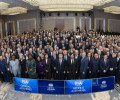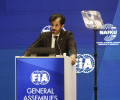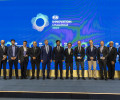Speech of Jean Todt at the closing session of the 3rd Global Ministerial Conference on Road Safety in Stockholm
"We need a transformation in thinking. We must ensure that safety is the driving force behind the evolution of Mobility and transport." Jean Todt

Ministers, excellencies, ladies and gentlemen,
We have reached the end of our conference and I would like to extend my heartfelt thanks to everyone here. Tremendous thanks to the Swedish Government, Minister Eneroth and who for this commendable undertaking.
Over the past few days we’ve all made journeys – real journeys, and journeys of the imagination. Representatives of more than 140 countries have travelled to Sweden in the name of strengthening road safety. And to take stock of work done in the past Decade. Through some rich, innovative and powerful exchanges, we’ve journeyed to the future, to plan our roadmap for the coming years. Young people’s voices and civil society have been central to this. This is important, because it’s our young people who will live with the consequences of our decisions and actions.
Everyone gathered here is aware that the death and injury toll from road crashes has not fallen in 20 years. Throughout this conference, this unforgivable fact has forced us to look at ourselves and ask, in all honesty, do we currently value safety as the foundation of our road transport systems?
We say we care about road safety, but there is a big shortfall between what we say and what we do.
To reduce road deaths and injuries – and not just fatalistically tolerate them – we need a transformation in thinking. We need to evolve into a new era which is fundamentally and holistically grounded in safety.
This means laying down safety as a value so non-negotiable that – as in the aviation industry – it actually becomes part of the DNA of the road transport system. When we evaluate the effectiveness of the system, safety should be an inherent measure of success and value. If we can reshuffle the values that currently overpower our road transport systems (short-term cost-benefits, speed, personal choice, and so on) for one that prioritizes safety, then we have a real chance to make a change. When safety as a value becomes the guiding star for our road transport systems, with help of the UN Conventions, they will evolve, regardless of location or a country’s income level.
Some consumers (those who can afford to) are willing to pay more for safety. Which means that we accept it as a commodity. In doing this, we send the message that it’s acceptable for some people to be safe on the road, but not all. What will we do to change that? Coming from the world of motorsports, safety was core to all we did. There was a system in place and it was the system that assured the safety of the sport. I was shocked to see that this wasn’t the case for road transport, and how society was so indifferent to road crash deaths. When I took on the role of the United Nations Secretary-General’s Special Envoy for Road Safety, I thought it was something we could easily change. I thought it was a matter of getting people to do what we knew worked. I finally understand that – unlike in the motorsports world, or the airline industry – safety isn’t necessarily the guiding star. It is just one of several factors that can be demoted in favour of other factors at any turn.
This is where we are going wrong.
So, this means the journey for us is just starting. Countries are not all at the same starting point and are dealing with different challenges. Our aim is to ensure that transport systems, no matter how they are configured, are safe, sustainable, and equitable. To do this, there’s one thing we can and must ensure as we travel home: that we will all commit to making safety the underpinning value of how we act in the interest of road safety for all. We must ensure that safety is the driving force behind the evolution of mobility and transport.
This message needs to be also heard by the car manufacturers and suppliers, who were underrepresented at the conference this week: no more unworthy products. We can no longer accept them. Same for road investments: “killer roads” are a waste of resources. The money should be there - we have heard how the investment banks intend to make their contribution. States can do the same by supporting the United Nations Road Safety Fund and also how they arrange their own budgets at home.
The will to act is there – we have heard so from ministers. We garnered great interest, mobilised actors and collected needed tools. Today, we can add the final ingredient: a commitment to make safety the core value of all we do as citizens, ministers, road safety experts, producers, and consumers when it comes to our mobility systems.
And if we don’t?
Let’s fast forward 10 years. We are in 2030. Our headline statistic is that despite ongoing road safety interventions, road traffic deaths and injuries are still running at around 1.4 million per year. Nothing has changed – except that another 14 million people are now dead and 500 million more have sustained injuries. Some of these people are yet to be born. This future would mean we are short of yet another SDG target, betraying the UN 2030 agenda for Sustainable Development, with far too many being left behind.
But this is not inevitable.
What if our conference here helps us avoid this scenario? What better honour to give all those who have died on our roads in the past decades than to do things differently – to make safety first.
Is such a shift possible? The straight answer is yes: it has been done in other sectors. We owe it to the next generation to leave them with mobility that is not mired in deaths and injuries.
Ladies and gentlemen,
We must act on our belief that sustainable transport is possible. To the youth here today, my message is simple: we have heard you, and we commit to supporting your vision for safe and sustainable mobility. We will start by committing to valuing safety – by embedding it so firmly in our road transport systems that deaths and injuries are a thing of the past.
Let us not pass up this chance to do things differently. Thank you
Jean Todt, United Nations Secretary-General’s Special Envoy for Road Safety and FIA President

 Facebook
Facebook Twitter
Twitter






